Alexander Afenyo-Markin, the Deputy Majority Leader, has suggested lowering the number of seats in Parliament from 275 to 200.
The Member of Parliament for the Effutu constituency stated his idea will reduce burden on the public purse.
“I must say that one critical thing to look at is to put an upper limit on the number of MPs that we must elect each year. It is unpalatable that a small country like Ghana with its many financial problems has 275 MPs. In contrast with all its financial muscle, Australia has 151 and 76 senators. We need a change in the law to stop the unnecessary expansion in the number of seats in our Parliament. We must reduce the number of seats in our parliament from 275 to 200.”
On March 15, the Effutu lawmaker made the remarks at the GIMPA Law Conference for this year.
He continued by saying that Ghana needs an upper chamber known as the House of Elders.
He has suggested that the Council of State be changed to accomplish this in order to achieve his goals.

“I hold the view that Ghana needs an upper chamber, it should be known as the House of Elders whose election shall remain non-partisan and whose primary role shall be to moderate the current parliamentary excesses and extreme partisanship.
“Thus the Council of State should be converted into the Upper Chamber of Parliament…I am not suggesting that the current Council of State is not helpful.”
Mr. Afenyo-Markin also bemoaned difficulties with MPs’ roles, claiming that they have turned into development agents in opposition to their roles as legislators and electorate representatives.
He claimed that as a result, some Lawmakers retired as beggars and now lead wretched lives.
He continued by saying that charges that some MPs are corrupt are wholly unfounded when one considers their post-House lives.
“Although lawmakers are not strictly speaking development agents, many MPs have had to dig so deep into their private pockets to provide public infrastructure to benefit underserved communities in their constituencies. In the process, many MPs have retired as paupers and have to deal with the pain of paying for private loans they contracted in their time in office to provide for the needs of their constituents.”
















